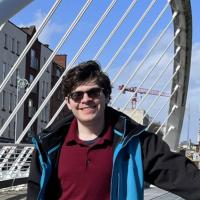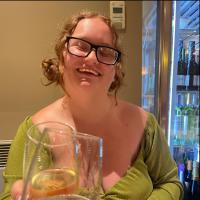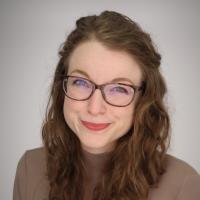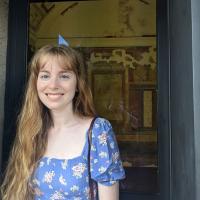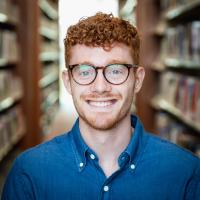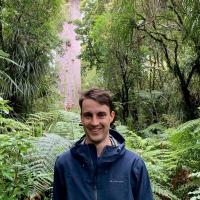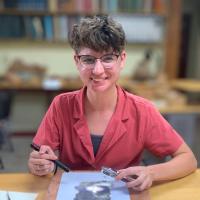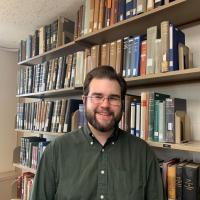Emily AguilarAncient Philosophy | Emily (she/her) joined the PhD program in Fall 2023. She received her A.B. in Classical Languages from Bryn Mawr College in 2022 and her M.A. from Bryn Mawr in 2023 with a thesis on the female reproductive system in Platonic, Hermetic, and alchemical cosmogony. She is interested in ancient philosophy and religion, especially in metaphysics, religious syncretism, and the evolution of the Platonic tradition. Outside of her academic work, she enjoys hiking and reading science fiction. | |
Eric BlumClassical Literature and Philology | Eric Blum joined the Cornell Classics department in Fall 2022. He earned his B.A. in Classics summa cum laude with a minor in Linguistics from Brandeis University that same year, writing his senior thesis on the linguistics and poetics of the particle γε in Homer. Since then, his research interests have shifted towards Greek lyric (including tragic lyric), principally Pindar and Aeschylus. His chief ζητήματα relate to poetry which is purposefully and artfully difficult to understand, and divide into two main avenues: first, the classical philological approach of searching for solutions to such mysterious passages, and second, the more modern and theoretical investigation of the effect of this style upon audiences and readers. In addition to being trained in Indo-European linguistics and Classical Sanskrit, he is also interested in the reception of classical literature among the early 20th-century modernists such as Joyce and Pound. | |
| Bee CandelariaAncient History | Bee Candelaria (she/her) joined the PhD program in Fall 2024 on the Ancient History track. She is a first generation high school and college graduate, the first of her family to attend graduate school, a QuestBridge alumna, and a Mellon Mays Fellow. She graduated with a BA cum laude from Carleton College in 2024 with a major in Classics and minor in Archaeology. Her research focuses on labor history in the Greco-Roman world, concentrating on the experience of poverty through an intersectional lens. Additionally, Bee researches how the discipline of Classics interacts with systems of power in our contemporary world. Outside of her academic life, she enjoys cooking, baking, and gardening. |
Evan ColbyGreek and Latin Languages and Linguistics | After graduating from UNC-Chapel Hill in 2020 with a BA in Classics and Linguistics, Evan joined the department of Classics at Cornell in the fall of the same year. His interests are mostly linguistic in nature and are centered primarily on Greek, including Modern Greek. Some of these linguistic interests include Greek and Latin historical phonology and morphology, the Homeric Kunstsprache, phonological theory, and the reconstruction of Proto-Indo-European. He also maintains an interest in epic as a literary genre, with a focus on Homer and Vergil. | |
Leah Cynara CookClassical Literature and Philology | Leah is a PhD student in Classics, working towards her degree through the Employee Degree Program. She earned her B.A. from Cornell University in 1993, dual majoring in Classics and Philosophy, graduating magna cum laude in Classics and with distinction in all subjects. Her research interests include the intersections of ancient magic, epic poetry, and pharmacology and botany. She is also the program coordinator for the Plant Sciences major in the College of Agriculture and Life Sciences at Cornell. | |
Ethan Della RoccaClassical Literature and Philology | Ethan joined the Classics department as a PhD student in the fall of 2020. He graduated magna cum laude from the University of Chicago that same year, receiving a B.A. in both Classics (with honors) and Philosophy. He is interested in the intersection of literary form and philosophical thought, particularly in the works of Lucretius and Seneca. Other interests include the role of digital humanities within Classics as a tool for both research and education. During his time in Chicago, he worked on the Logeion project and developed the parsing feature Morpho. At Cornell, he has continued his work in digital humanities with the Lexeis project. | |
Stephen FodrocziClassical Literature and Philology | Stephen graduated magna cum laude from Florida State University in Spring 2020, receiving three degrees in Classics, Music, and English Literature. He is a fifth year PhD candidate in Classical Literature and Philology and is currently working on a dissertation that reexamines the definition and employment of the classical trope of “katabasis” across the matrices of gender, race, and enslavement. He is interested in orality, ancient music and performance, Athenian drama, classical reception, and cicadas. In 2023 he received a Buttrick Crippen fellowship to design and teach his FWS course, “Ancient Underworlds, Fresh Hells: Katabatic Literature and Media.” He is happy to chat with prospective students about his experiences. | |
Olivia GravesClassical Archaeology and Art | Olivia Graves is a PhD candidate concentrating on the archaeology of the Roman economy. Before starting at Cornell in Fall 2020, Olivia earned a B.A. in English and Classics from UC Berkeley, an MPhil in Archaeology from the University of Oxford, and a Post-Baccalaureate Certificate in Classics from UCLA. Olivia’s research mobilizes archaeological coin finds towards questions pertaining to the socioeconomic and monetary history of the Roman world. Her dissertation examines coin finds recovered from archaeological sites in Roman Italy to explore the relationship(s) between political and economic change on the macro-scale and changing patterns of coin use on the micro-scale. Olivia has conducted archaeological fieldwork at the Mycenaean cemetery of Aidonia in Greece, the Roman small town of Dorchester-on-Thames in the UK, and most recently the Roman rural minor center of Marzuolo in Tuscany. In Spring 2023, she also curated coins for the exhibition, “Wonder and Wakefulness: The Nature of Pliny the Elder,” held at the Herbert F. Johnson Museum of Art. | |
Kate HallClassical Archaeology and Art | Kate joined the PhD program on the Classical Archaeology track in Fall 2024. She received her BA in Classical Civilization and Anthropology from Wellesley College and earned a MA in Archaeology from Cornell University. She is interested in the material and visual culture of the Late Bronze Age Eastern Mediterranean, especially funerary practice, art, violence and human-nature relationships. Her recent MA thesis explored the construction of warrior ideologies in the iconographic and mortuary contexts of Mycenae. She has excavated at Wellesley’s College Hall site as well as Despotiko, Greece and has participated in both archaeological and dendrochronological fieldwork in Cyprus. | |
Sam HenthornClassical Literature and Philology | Sam joined Cornell as a PhD candidate in Classical Philology and Literature in the Fall of 2024. He received a BA in Classics from Wabash college summa cum laude in 2020 and an MA in Classical Languages from the University of Georgia in the Spring 2024. Sam is interested in the intersection between early Christian and (so-called) pagan literature with an eye towards understanding the complexities of Roman identity in the Late Antique period. | |
|
| Hyeonseo KimClassical Literature and Philology | Hyeonseo (pronounced hyun-suh) joined the PhD program in Fall 2022. She received her BA in Philosophy and Classics from Seoul National University in 2019, and a Classics MA in 2022 from the same institution. She is interested in how language is manipulated to different ends, the conceptualization and transmission of this skill, and the implications of using good or bad language. She has been exploring these questions with Pindar's epinicians and Latin rhetorical texts. Hyeonseo very much enjoys learning and teaching languages herself. |
Clara McCafferty WrightClassical Archaeology and Art | Clara McCafferty Wright is a doctoral student at Cornell University in Classical Archaeology and Art. Her primary research foci include Ptolemaic and Roman Egypt, and Greco-Roman reception of Egypt. She recently completed an MPhil degree in Egyptology at the University of Cambridge with a dissertation entitled, “Reconsidering Cleopatra VII: The Lost Narrative of Egypt’s Last Queen.” Clara earned her A.B. at Bryn Mawr College in 2019, where she double majored in Classical and Near Eastern Archaeology & Classical Cultures and Societies. At Bryn Mawr, she was a Hanna Holborn Gray Research Fellow and authored a thesis on Cleopatra VII’s political influence on the Isis cult in Italy. During her undergraduate degree, she also studied in the Egyptology programs at the University of Pennsylvania and the American University in Cairo. In addition, she established The Bryn Mawr College Magic Lantern Slide Digitization Project. Clara currently serves as a Director of The American Research Center in Egypt—Missouri Chapter, and a team member of the Egyptology State of the Field Survey Project. Clara is passionate about diversifying our understanding of the ancient world to one which includes the narratives of disenfranchised members of societies, including women, enslaved people, and the working class. She has a strong interest in using the study of the past to empower people today by making information on the ancient world accessible to rural and underprivileged communities. | |
Liam McDonaldClassical Archaeology and Art | Liam is a PhD candidate in Classical Archaeology. He received his BA (Hons) in Anthropology from the University of Auckland in 2014 and his MSc in Archaeological Science from the University of Oxford in 2016. He has worked in CRM archaeology in New Zealand and at the Auckland Museum. He is a member of the Cornell Tree-Ring Laboratory specializing in dendrochemistry. His dissertation uses tree-ring width patterns and chemical signatures to identify the provenance of archaeological wood with the goal of improving palaeoclimate reconstructions. His other research interests include radiocarbon dating and calibration, human-environment interactions, and scientific approaches to the archaeological record. | |
Sara MerkerClassical Literature and Philology | Sara Merker is a fourth-year PhD candidate concentrating in Classical Philology and Literature. She graduated with Distinction from McGill University (2020), receiving a B.A. with First Class Honours in Classics. At Cornell, Sara has specialized in the topics of religious entrepreneurship (2nd - 4th centuries CE), Roman law and literature, and Second Sophistic literature. The goal of Sara’s dissertation, tentatively titled “Humor in Early Christian Polemic,” is to analyze early Christian polemical treatises as rhetorical texts which strategically employ humor as a method of persuasion and literary composition. This research is significant as it overturns traditional scholarship which assumes a negative relationship between ‘Christianity’ and humor, a conclusion often based on the abstract opinions of select late antique Christian authors. | |
Jordan MurphyClassical Archaeology and Art | Jordan (she/they) is a third-year Ph.D. student in Classics in the Archaeology and Art track. She received her B.A. in Classical Civilizations and Political Science with a minor in Anthropology from U.C. Berkeley in 2023 (Phi Beta Kappa, Pi Sigma Alpha, with Highest Honors in Classics). They are primarily interested in Late Bronze Age and Early Iron Age political and economic institutions, the development of complexity, and the archaeology of non-elites in the eastern Mediterranean. She has participated in archaeological fieldwork in Greece, Turkey, Cyprus, and New York. | |
|
| Alessandro Peiris PattiyageAncient Philosophy | Alessandro joined the Ancient Philosophy concentration in 2021, after receiving his BA and MA in Classics from the University of Florence. During his MA, he also studied Ancient Philosophy and Indian Philosophy at the Ludwig Maximilian University of Munich. Besides Greek and Latin philosophical texts, his interests include Sanskrit and Indian Philosophy. |
Ruth PortesClassical Archaeology and Art | Ruth received her B.A. in Archaeology and Writing from Johns Hopkins University (2016), and her M.A. in Ancient Greek and Roman Studies from Brandeis University (2018). She is a Ph.D. Candidate specializing in the ancient Black Sea Region. Her work focuses on the social and cultural shifts that took place in the mid-first millennium BCE, and how Greek settlement on the coast of modern Georgia played into these wider changes. She has participated in archaeological projects in Spain, Israel, Mongolia, and Georgia. She is on the organizing committee and a founding member of the CIAMS Anti-colonialism and Anti-racism (ARCO) Interest Group, as well as a co-founder of Coffee Hour for Classicists of Color. She is always happy to talk about her experiences as a graduate student or in any of the above mentioned areas. | |
Carson RiggsClassical Archaeology and Art | Carson is a second-year Ph.D. student in the Archaeology and Art track. She earned an A.B. in Classical Archaeology modified with Medieval Studies (salutatorian, Phi Beta Kappa, summa cum laude with high departmental honors) from Dartmouth College in 2023. She has participated in excavations in the United States, Ireland, and Turkey; most recently, she was an assistant trench supervisor at the Harvard-Cornell Exploration of Ancient Sardis. Carson is interested in the intersection of religion, medicine, and “magic” in Late Antiquity. She is also interested in apotropaic objects, object agency, and early Christian texts. | |
Sophia TaborskiClassical Archaeology | Sophia Taborski is a PhD candidate in classical archaeology. They received their B. Phil. from the University of Pittsburgh in Classics and History and have taught English, Latin, and history in primary and secondary education. In their dissertation, titled “Inscribing Violence: Curse Tablets in the Roman Empire” they examine the texts, contexts, orthography, and materiality of curse tablets to explore violence, embodiment, power dynamics, and intersectional identities and experiences such as disability, enslavement, race, gender, and sexuality. They have taken RTI (Reflectance Transformation Imaging) image sets of curse tablets in the Medici Library in Florence, the Diocletian Baths Museum in Rome, the Roman Bath Museum in Bath, and in the Stoa of Attalos in Athens and the National Archaeological Museum of Corinth as an Associate Member of the American School for Classical Studies. They have excavated in Argilos, Greece, and at St. James AME Zion Church, Ithaca. Other interests include religion, medicine, cognitive approaches, pedagogy, and domestic archaeology. | |
|
|
Terek WalkerClassical Literature and Philology |
Terek (he/him) joined the Classics department as a PhD student in the fall of 2023. He received his BA in Classics (with honors) from the University of California, Davis in 2022 and completed the post-baccalaureate program at UC Davis in the spring of 2023. His interests include Latin love elegy, specifically the poetry of Catullus and Propertius, as well as Greek funerary epigraphy and its relationship with Homeric epic. |


